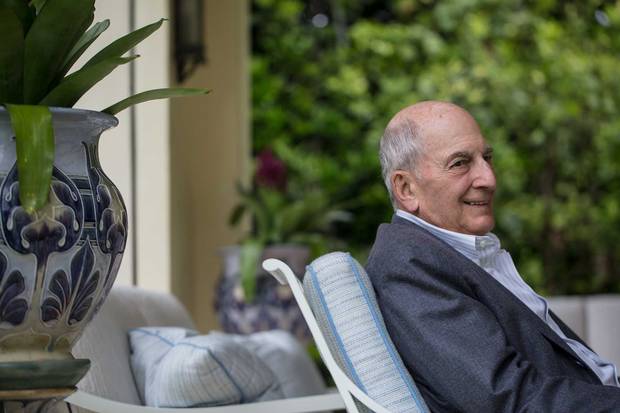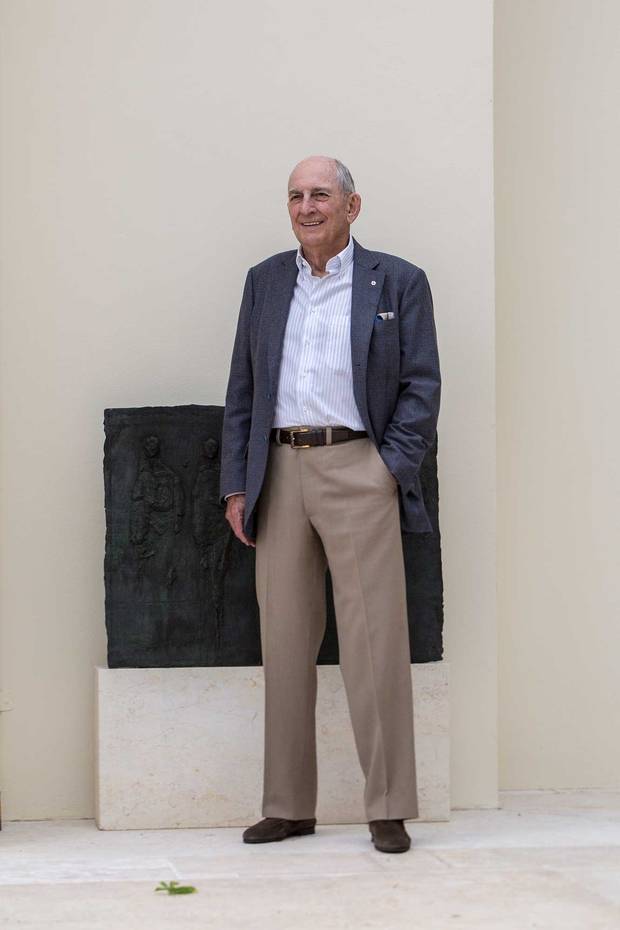
Charles Bronfman photographed at his home in Palm Beach, Florida
Erika Larsen/Redux Pictures
If you're the fourth child of any family, you have fourth-child syndrome.
For some goofy reason—maybe it was our parents, who just played it all down—our wealth was not part of the equation.
I was sickly as child, and with me, my dad was very sweet. He was in New York four or five days week, building his business. When he was home, he would give us these homilies, and the other kids would say, "Oh not another one." I would drink it up. They were very simple, and to me, simple is profound.
One I'll always remember is: If you do a deal, leave something on the table. Don't squeeze them.
The other lesson I learned from him was that you might be good, but don't flaunt it. He didn't flaunt it. He had a big house, but he did not live in a grand style.
My brother was both my protector and bully. He was tough and I was soft. If I loved a hockey or baseball team, I had to bet on them. He could love them, but that had nothing to do with betting. He could separate that out. I could not. You can't love something if you're betting against it.
When this baseball thing came along, I thought, I can do something not on my mother's terms.
My proudest moment as owner of the Expos was opening day in Montreal. It was a beautiful, sunny day, and everyone was happier than heck. It just seemed it was a perfect day, including the results of the game—8-7 against the St. Louis Cardinals.
We soon found out we couldn't get free agents of any calibre, for two reasons: taxes and the language issue. Montreal really was a foreign country to them.
When our first manager, an old-fashioned baseball guy, saw that cap, he blanched. No one had a three-coloured hat. He said we were going to look like tiddlywinks players.
I think losing the Expos affected the morale of the city. But at that point, they were no longer the darlings of Montreal. It was too bad, so sad.
My team is the Mets—it was the Mets before the Expos, and it became the Mets after. They opposed the Yankees, and I've hated the Yankees since I was four years old. They were just too cock-of the-walk. I felt an underdog, so I rooted for the underdogs.
Making Edgar Jr. CEO was a big mistake. And I found out about that reading Fortune magazine. I didn't give a damn whether my kids were in Seagram or not. I knew they'd be wealthy, but I hoped they'd do their own thing. I told them, "I don't care what you do, as long as you're the best at it." I told my son, Steve: "You want to be a bum, fine—but be the best damn bum there is."
The DuPont sale was debilitating. I had many discussions with the two Edgars, and I couldn't budge them. I thought of going to the board. But I thought there'd be a family war, and it would be in all the newspapers. Nobody wins in a family war.
With Seagram, I wasn't so sorry for myself. I was sad for the shareholders, the employees and the culture that existed. It was suddenly swept out to sea off a lovely ship.
My father used to say, "Good relations start with clear understandings." And we did not have a clear understanding, my brother and I. We were equal shareholders, but he was the operating side of the business and I wasn't.

Look, the money turned out to be okay. I'm living in a beautiful house in Palm Beach. So I can't start bitching and moaning. But the tragedy of seeing what my father spent his life doing evaporate, and all the people who were there…it's not nostalgia, it's sadness.
I resolved it with my brother. I never did resolve it with his son.
By the third generation, go outside. That's what we should've done—we should've gotten the best damn CEO we could.
What makes me happy about all this is, I was an inheritor, but I became a pioneer.
Canadians had no real idea of what the heck the country stood for. That's why we did the Heritage Minutes. It was not only fun, but it succeeded. Birthright Israel was the same idea. Because I was such a lousy student, I know you learn when you're having fun.
I signed up for the Giving pledge because I thought that if I did it, maybe more Canadians would do it, too.
I voted in the presidential election—the first time I've ever voted here. It turned out poorly, thank-you.
It's not just the anti-semitism. We all have our prejudices, for and against. But there are layers of civility that have built up, so we have a filter, and we keep whatever prejudices we have under wraps. What's happened with Trump is, he has swept away all the layers of civility.
I'm not an expert, but income inequality can certainly be resolved. The wealthy pay higher taxes—so what? It's not going to hurt your lifestyle. But is that where it's at? I'm not so sure. I think it's jobs. Automation and the pace of innovation is just killing jobs.
Fortunately, as I tell my American friends, I can always go back to Canada. I might have become a citizen here, but my heart is always back in Canada.

Erika Larsen/ Redux Pictures
Want to interact with other informed Canadians and Globe journalists? Join our exclusive Globe and Mail
subscribers Facebook group
Dawn Calleja is a senior editor with
Report on Business magazine. You can reach her at dcalleja@globeandmail.com or on Twitter @dawncalleja